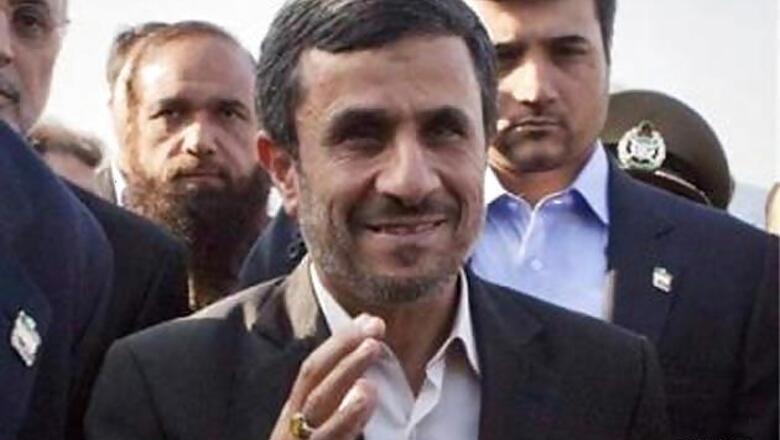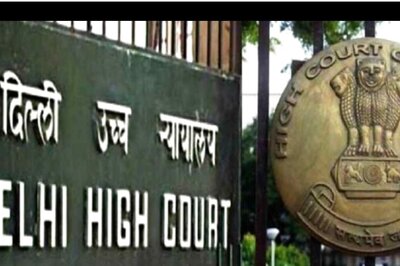
views
Vienna: Iran, facing severe sanctions to bar it from exporting oil, has told world powers it wants to resume long-stalled talks quickly with "new initiatives" in hand, and France said Tehran may now be open to addressing concerns about its nuclear quest.
Tehran made the offer in a letter to the EU's foreign policy chief obtained by Reuters on Thursday, a day after it trumpeted several advances in nuclear know-how and sent oil prices upward with suggestions of economic retaliation in what may have been moves to boost its leverage before any fresh negotiations.
Iran's president vowed no retreat from its atomic path on Wednesday only for state television to announce the proposal to re-launch talks after a year's hiatus - mixed signals making it difficult to divine what Tehran's ultimate intentions were.
Iranian chief negotiator Saeed Jalili's letter said he would have "new initiatives" but did not spell them out. He made one separate reference to "Iran's nuclear issue", without spelling out whether Tehran was prepared to negotiate on it.
But French Foreign Minister Alain Juppe said that while the letter was "ambiguous" it seemed to signal "the start of opening up from Iran" with respect to discussing its nuclear activity.
A February 20-21 visit to Iran by top UN nuclear watchdog officials would help determine whether Tehran was serious about tackling international concerns, Juppe told reporters during a visit to Vienna.
The UN team, led by the International Atomic Energy Agency's chief inspector, will again try to extract Iranian explanations, after three years of stonewalling, for an IAEA investigation driven by intelligence reports that suggest Tehran has researched sophisticated ways to build atomic bombs.
Jalili's letter was a reply to one from Ashton in October in which she said the big powers could meet with Iran within weeks if it was ready to "engage seriously in meaningful discussions" tackling concerns about its nuclear programme.
Jalili said he welcomed an earlier statement by Ashton on respecting Iran's right to the peaceful use of nuclear energy.
"(A) constructive and positive attitude towards the Islamic Republic of Iran's new initiatives in this round of talks could open positive perspective for our negotiation," Jalili said in the brief English-language letter.
"Therefore...I propose to resume our talks in order to take fundamental steps for sustainable cooperation in the earliest possibility in a mutually agreed venue and time."
Jalili urged a focus "on a spectrum of various issues" to lay groundwork for "constructive, forward-looking cooperation".
Clashing agendas
His message resembled Iran's agenda in previous abortive talks, floating undefined ideas for security and trade cooperation while avoiding discussion of steps sought by world powers to guarantee that its nuclear programme is peaceful in nature and transparent for IAEA inspectors and investigators.
Western officials said the powers were consulting on a response to Jalili's letter, with a British Foreign Office spokesman saying they were checking closely to see whether Iran "is ready to engage meaningfully".
A British government source struck a cautiously positive note: "The key issue last time was (Iranian) pre-conditions, and pre-conditions are not mentioned in (this) letter."
The United States and its allies suspect Iran is seeking to develop nuclear weapons capability under cover of a declared civilian nuclear energy programme, and believe Tehran has used talks only as a time-buying tool, not a pathway to agreement.
Iran says it is enriching uranium only for electricity for a burgeoning population. But after a U.N. watchdog report in November hardened suspicions of Iranian work on a nuclear bomb design, the United States and EU adopted sanctions meant to shut down Iran's oil export industry, the world's fifth largest.
The clampdown on Iranian oil would take full effect in July.
Ashton handles the Iran file on behalf of six world powers - the United States, Russia, China, Germany, France and Britain. Negotiations have been frozen since a fruitless meeting in Istanbul in January 2011.
Iran's ambassador to Moscow, Seyed Mahmoud Reza Sajjadi, told a news conference that Tehran would accept "no preliminary conditions" for progress in any further talks.
He was responding to a question about a Russian suggestion that, as a first step toward a resolution of the standoff, Iran could take measures including freezing the number of centrifuges for uranium enrichment at current levels in return for assurances it would face no additional sanctions.
Defiant on oil sanctions
Sajjadi also shrugged off Iran's shrinking oil trade with countries punishing Tehran over its nuclear programme, asserting that Iran - which has been heavily dependent on imported fuel - would benefit from any ban on its crude exports by boosting domestic production of refined fuels.
"Iranians will show the whole world how they can use an embargo as an opportunity," he said.
Tehran's determination to pursue its nuclear programme has shown no sign of wavering despite Western sanctions that are inflicting increasing damage on its oil-based economy.
To underline that it could withstand whatever punishment the West imposes on it, Iran proclaimed three nuclear achievements on Wednesday.
They consisted of a "new generation" of centrifuge machine able to refine uranium three times as fast as the outdated, erratic model it is using now, a major increase in the number of centrifuges available for enrichment, and loading a research reactor with Iran's first batch of domestically produced fuel.
If Iran succeeded in introducing modern centrifuges for production, it could significantly shorten the time needed to stockpile enriched uranium, which can generate electricity or, if refined much more, produce nuclear explosions.
But it remains unclear whether Tehran, under increasingly tight trade sanctions, has the means and components to make the more sophisticated machines in industrial quantity.
Western diplomats and analysts said the Iranian announcements were largely hype and bluff, noting that Iran had been trying to develop several newer versions of centrifuges for years without introducing them into production.
Iran denies cutting off oil to EU now
Iran's Oil Ministry denied a state media report that it had cut off oil exports to six EU states, while leaving open the option as a pre-emptive strike against an EU plan to launch an embargo on Iranian oil on July 1.
Whether erroneous or just premature, the report caused a spike in oil prices to their highest level since August.
Iran is the world's No. 5 oil exporter, with 2.6 million barrels going abroad daily, about a fifth of it to EU countries.
Western sanctions are spreading to block Iran's oil exports and central bank financing of trade, and Tehran has resorted to barter to import staples like rice, cooking oil and tea, commodities traders say.
The Obama administration is also pressing the European Union and SWIFT, the global organisation that facilitates most of the world's cross-border payments, to expel Iranian banks from its network, a new step in the push to deprive Iran of funds, a U.S. official said on Wednesday.


















Comments
0 comment